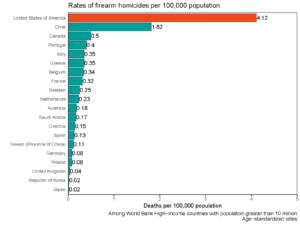Before we get to the subjects above, this is also the Sunday when we commemorate the First Ecumenical Council. Ancient Church councils.. dull? Not! You might want to read these two Posts from five years ago:
14. The Story of the Fathers of the First Ecumenical Council: Part 1
15. The Story of the Fathers of the First Ecumenical Council: Part 2
______________________________________________
Now on to today’s two topics:
Last Monday morning, I read the news and found a list of at least twelve mass shootings in America over the weekend. Long ago when I was young, America usually had four or five mass shootings per year. Then I checked the Orthodox news and there, as if by design from On High, was this short and very relevant talk by Archbishop Elpidophoros.
I shared the speech with a good friend of mine who described it as follows: “The right message for our time. No preening, no grandstanding, no slight of hand. Just the Gospel of the man born blind and Jesus, spelled out for those who are blind to the truth of this moment—that gun violence in this country has escalated to the level of a pandemic. This crystal clear pastoral teaching is rare: I dare say at the moment unequalled.”
Forgive me for foisting statistics on you, but it helps to see by how very much the USA is an outlier in this regard. All sources show similar results.
Graph source: IHME/Scott Glenn (March 31, 2021)
1. Archbishop Elpidophoros about the Blind Man
His Eminence Elpidophoros is Greek Orthodox Archbishop of America. He delivered this speech on the Sixth Sunday of Pascha, the Sunday of the Man Born Blind, at Saints Constantine and Helen Church, Jackson Heights, New York

My dear brothers and sisters in Christ:
Christ is Risen!
We have arrived at the last Sunday of the Forty Day celebration of our Lord and Savior’s Resurrection.
These Forty Days, which come to a close later this week – on the feast of the Ascension – are the counterweight to the period of Holy and Great Lent. Indeed, we go from a Fast of Forty Days to a Feast of Forty Days! And through these weeks of the Pentecostarion, which take us all the way to Pentecost – the Fiftieth Day after Pascha – we have now arrived at the final Sunday, that of the Man Born Blind, or in Greek, τοῦ ἐκ γενετῆς Τυφλοῦ.
As you know, there are profound teachings in this Gospel Reading. But for us, perhaps, the most profound lesson is that someone who absolutely knew that he could not see – since he was blind from birth – gained the gift of sight for the first time in his life. And those who said they could see were instead called blind by the Lord.
This contrast is unforgettable. And it speaks to us, especially in our own confusing times, when we see the suffering in our country and around the world.
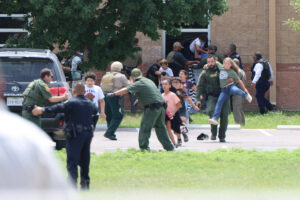
Like the violence, we witnessed in Texas last week, when nineteen little children were murdered in their school, together with two of their teachers. And there are those who will say that they have the answer and that they can fix this problem by installing stronger doors, arming teachers with more guns, or blaming everyone and everything except the weapons and their easy availability.
This, my friends, is blindness. This is the inability to see the truth because you do not want to see it. The Pharisees in the Gospel today could not admit that the Man Born Blind had truly been healed. They found every reason to believe the lie they constructed for themselves, so as to keep themselves in power.
And this is the case with the violence in Texas last week, too. Everyone and everything are being blamed in order to avoid the truth. Here, in the wealthiest country on earth, we are so morally and spiritually impoverished that we feel anyone has the right to arm themselves for battle like a soldier, and to become instantly capable of wreaking mass death on others – even on innocent children.
However, the honesty that our faith in Jesus Christ calls us to is a hard honesty. It summons us to take responsibility for our actions and to see with the clarity of truth and not the fog of delusion. This can be distressing, though, even radically so, for our lives, our emotions, our minds and souls, and even our families. But it is the only authentic way to live as a Christian.
The Man Born Blind was able to see because he listened to the Word of God. Jesus told him what to do and where to go. He followed his instructions to the letter. He knew he was blind; he at least saw that clearly enough.
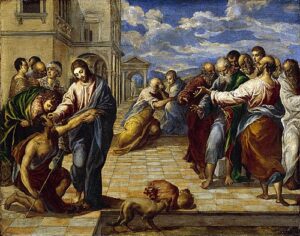 The Pharisees used every twist and turn of language to deny the miracle, calling everyone’s honesty into question except their own. And so, our Lord told them:
The Pharisees used every twist and turn of language to deny the miracle, calling everyone’s honesty into question except their own. And so, our Lord told them:
El Greco, c 1570
“If you were blind, you would have no guilt. But then you say, ‘We see!’ Therefore, your guilt remains.” [John 9:14]
It is in the arrogance of the human being that blindness truly exists. And it is in the honesty of the human being that the vision of reality begins to become clear.
Thus, may we always choose to follow the path of honesty and to remain faithful to the Lord’s commandments – and above all, the commandment to love one another.
Χριστὸς Ἀνέστη! [and in response: Ἀληθῶς Ἀνέστη!]
Source: Greek Orthodox Archdiocese of America via “The Orthodox Times”
_____________________________________________________________
2. Where is Christ now?
Quick answer: Christ is now present on earth and in all other worlds that may exist. He is now present in hades. He is now present in whatever land lies between earth and Heaven. He is now present in the Heavens and in that Heaven which lies beyond all Heavens. Thus He always has been, is now and always will be, unto ages of ages. Amen.
We must prepare now to expand our minds.
Let’s begin by looking at yesterday’s feast of …
The Ascension of our Lord and God and Savior Jesus Christ
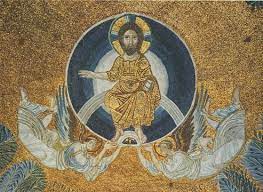
Ninth century mosaic, Agia Sophia, Constantinople
Icons with permission of Saint Isaac’s Skete at skete.com
Scripture Readings: Mark 16:9-20, Acts 1:1-12, Luke 24:36-53
We’ll try to answer a series of questions.
1 Did Christ literally ascend upwards? Yes, He did. But not for long.
Here are the three accounts of His Ascension. (Both Acts and Luke were written by Saint Luke.)
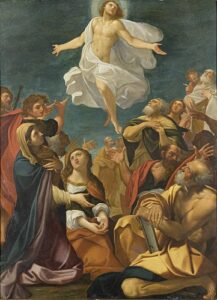
Though possibly not like this! (What was it with these Renaissance artists? Even Jesus doesn’t get any clothes?) by Giacomo Cavedone, c 1640
Mark: “So then the Lord Jesus, after he had spoken to them, was taken up into heaven, and sat down at the right hand of God. And they went forth and preached everywhere, while the Lord worked with them.”
Acts: “…He was lifted up, and a cloud took him out of their sight. And while they were gazing into heaven as he went, behold, two men stood by them in white robes, and said, ‘Men of Galilee, why do you stand looking into heaven?'”
Luke: “Then he led them out as far as Bethany, and lifting up his hands, he blessed them. While he blessed them, he parted from them, and was carried up into heaven.”
But certainly He did not keep ascending in a physical way. Even traveling at the speed of light, today He would scarcely have begun the trip. Besides, as I’m sure you know, Heaven is not literally “up there”. Christ ascended to Heaven in the same sense that we say a fourth grader moves “up” to the fifth grade, or a businessperson takes a “higher” position.
His literal ascending in the presence of the Apostles was a symbolic action, His way of showing that He was returning to that better, superior, higher World. Heaven is a different dimension, we might say. (Have you read C.S. Lewis’ The Chronicles of Narnia?) I think the Apostles knew that. Those who wrote the words of the Creed certainly understood: the Greeks knew the earth is round and believed the “dome” of the heavens to be at an infinite distance from earth – something not far from what modern astronomy has discovered.
2 Did Christ leave Heaven and come to earth? No, He did not.
Jesus Christ is Lord and God, Who by His very “nature” cannot leave anywhere. He was and is and always will be everywhere present.
We have hymns in the Menaion – none of which, unfortunately, I can locate now; I’ve searched, but there are so many hymns – which tell specifically that Christ “came to earth without leaving Heaven”. As He lay in the womb of His Mother, as He walked the hills of Galilee, He was at the same time fully present in Heaven with His Father. Even “O Christ Jesus, our Savior, in the grave You were laid; yet You did not leave the bosom * of Your Father”. First Stasis of the Lamentations for Holy Friday
- An old Hebrew expression. Remember When you were a child and were held and hugged by your father or mother, as close to them as you could be. Like that.
When Christ “came down from Heaven and was incarnate of the Holy Spirit and the Virgin Mary and became Man”, rather than leaving Heaven behind, He brought Heaven with Him, uniting Heaven and earth forever. He descended to earth in order that He could then lift up our world with Him into Heaven.
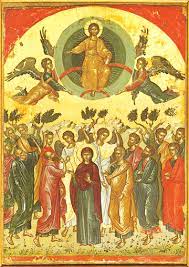
Stavronikita Moni, Mount Athos, by Theophanes the Cretan, 16th century
“O Lord, …You were being taken up to that Place from which You were never separated…” (Aposticha from the Friday after Ascension) But now He was different. He descended in Spirit. He ascended in His Body born of Mary, in the fullness of His human nature – soul, mind and body. He ascended, taking with Him mankind in the fullness of our human nature – soul, mind and body. That is our future. “Lo, I go to prepare a place for you.” John 14:3
“You were taken up into the Heavens with glory; and with Yourself You led up man’s essence and nature, adorning it with heavenly glory.” Canon of the Prefeast of the Ascension, Ode 4 verse 14
So… if you thought Heaven will be vague and cloudy and “spiritual”: Wrong! Turning to C.S. Lewis again: In his book The Great Divorce he imagined that Heaven will be not less “solid” than earth, but rather more “solid”, so that there we earthlings (as we are now) will seem like ghosts – until we are finally turned into “solid” people, real people. That was fictional, of course, but I think it gets the point across. “We shall be like Him” 1 John 3:2- and He is no ghost. In the End, at our bodily Resurrection in the New Age, it will turn out that, in a way, “we did take it with us”!
3 Did Christ leave the earth when He ascended into Heaven? No, He did not. He is still here.
He who is the Word of God forever orders all things. The Epistle to the Hebrews (quoting Psalm 102) addresses Christ like this: “You, Lord, in the beginning laid the foundation of the earth, and the heavens are the work of Your hands.They will perish, but You remain…;” Hebrews 1:10-11
Christ was behind the Big Bang that brought our universe into existence. He has been here from the dawn of creation, by His power ordering the quasars and galaxies into being. Christ Himself has directed the long, long process which led finally to the emergence of mankind. (If you believe He formed us in some other way, no problem, just so long He is the One who did it.) Christ is still here, ruling over the cosmos.
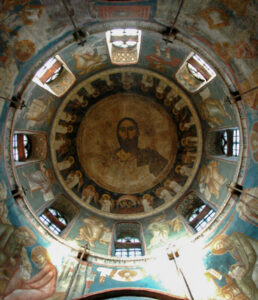
Decani Monastery, Kosovo
Years ago, when I was in an old catholikon (central church in a monastery) on Mount Athos, I raised my eyes and far up there in the dome was Jesus Christ Pantocrator with the light flowing in below Him – Christ ruling over all, even over the light itself. Soon after that my wife and I went to a planetarium show at the University of Wisconsin-Milwaukee, and as we all leaned back so we could see the dome of the sky, I realized: There, invisibly, above the dome of the heavens is Jesus Christ Pantocrator -always ruling over all things. Look up with your spiritual eyes, and you can see Him.
But Jesus Christ is closer to us than that. He promised “Where two or three are gathered together in my name, there am I in the midst of them.” Matthew 18:19–20 Just before His Ascension He promised “I am with you to the end of the Age”. Matthew 28:20 And then He left.
Just in passing, can you imagine anyone who has ever lived on earth saying those things and being taken seriously?
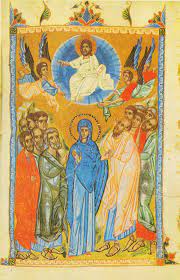
Armenian, 14th c
4 Has Christ departed from us bodily? Yes, He has and No, He has not. Yes, He ascended bodily. However, the Church also is the Body of Christ, the place of His presence: He reaches out to us and we can serve Him in bodily form in our brothers and sisters who comprise the Church. At the center of the Church’s life is: “This is my Body, given for you… do this to re-call Me.” At every Eucharist, He is present with us bodily, to feed us and share His Life with us and within us.
Also I think He is bodily present in another way: “Inasmuch as you have done it to these, the least of my brethren, you have done it to Me.” Matthew 25: 31-46 I think He is there in the bodies of the needy, waiting for us to feed and clothe and comfort Him.
So then, at the End of the Age, when Jesus Christ returns bodily in Glory to judge the living and the dead… He will return to this place which He never left.
Just one more thought: If Christ our God is always present everywhere, does this mean that in some way He is now, has always been, and will always be in Hades rescuing the dead of all times who wish to be saved?
For, after all:
 7 Where can I go from Your Spirit? Or where can I flee from Your presence?
7 Where can I go from Your Spirit? Or where can I flee from Your presence?
8 If I ascend into heaven, You are there; If I make my bed in hell, behold, You are there.
9 If I take the wings of the morning, And dwell in the uttermost parts of the sea,
10 Even there Your hand shall lead me, And Your right hand shall hold me.
11 If I say, “Surely the darkness shall fall on me,” Even the night shall be light about me;
12 Indeed, the darkness shall not hide from You, But the night shines as the day. The darkness and the light are both alike to You.
Psalm 139 (NKJV)
Next Week: Pentecost – A Beginner’s Introduction to the Doctrine of the Holy Trinity. If you thought the Ascension was mind-boggling, just wait…
Week after Next: As promised, The Wedding at Cana
